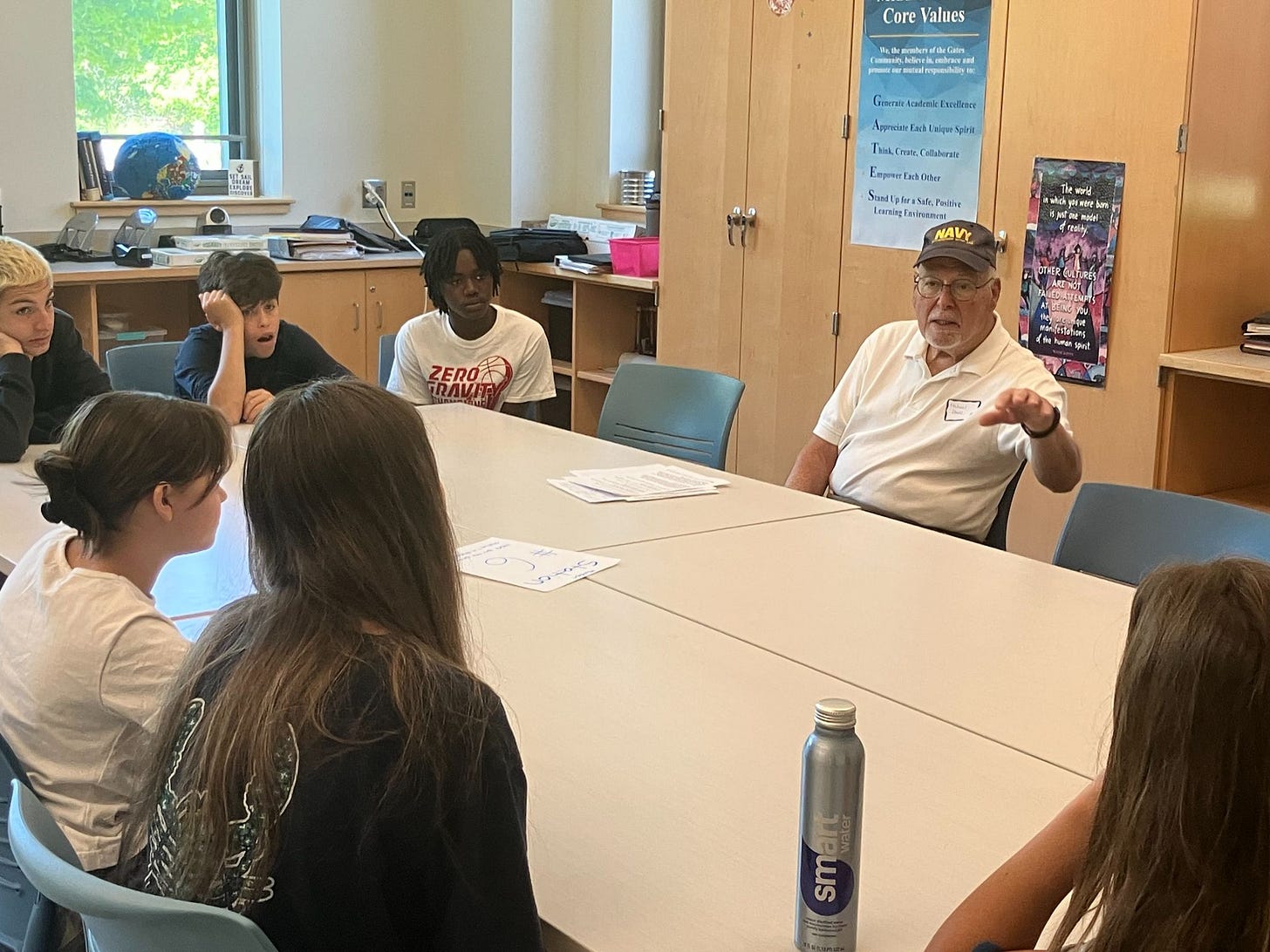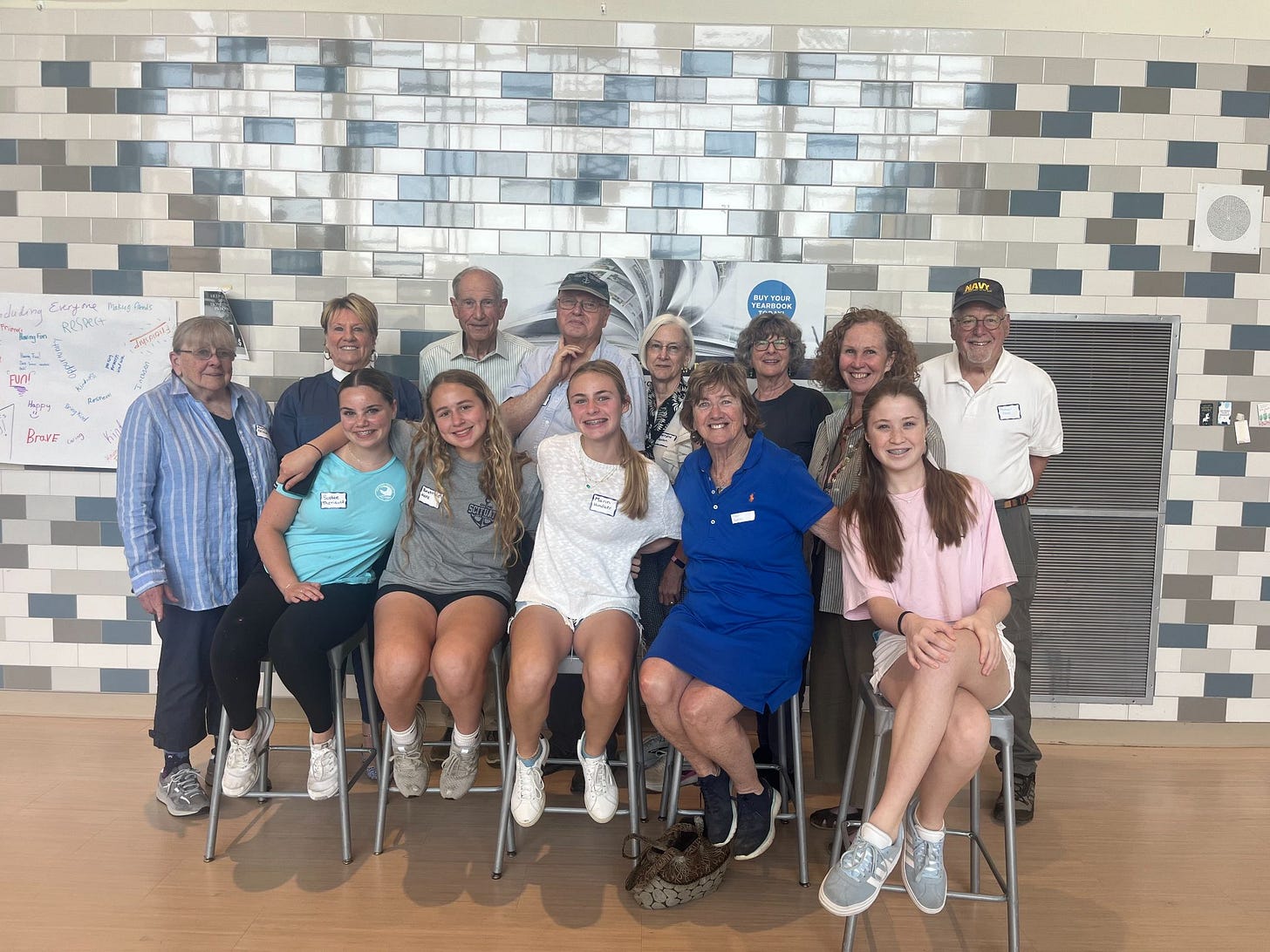This past school year a group of eighth grade students came up with a plan to bring their community together creating a line of communication between Gates Middle School students and local senior citizens in the small coastal town of Scituate, Massachusetts.
With the reintroduction of civics into the state’s social studies curriculum in 2018, Massachusetts embarked on a state-wide Civic Community Action project, a lengthy undertaking aimed at student-driven community contribution. Students are required to survey their communities, compile research to help solidify the need for action, and reach out to community members in positions to help students work within the constructs of local government. Not every idea meets success. Sometimes the failure to accomplish a desired result provides equally valuable lessons regarding challenges and a variety of potential obstacles. Students learn that being an active citizen requires persistent communication. The project makes it necessary for students to make phone calls, send emails and letters, schedule and attend meetings, compile and organize a detailed record of progress, and remain flexible with ideas that might transform over the course of several months as new information is gathered and analyzed. Students learn that creating change is a process that is often slow and incremental, requiring a high degree of purpose and determination.
Gates Middle School students Bea Hare, Finley Holland, Sophie Theriault, and Marin Hundahl originally investigated the idea of using dogs from the Scituate Animal Shelter to provide comfort and emotional support to local senior citizens at the Scituate Senior Center. This idea proved to be an immediate challenge, with obstacles created principally by the transport of dogs from the shelter to the Senior Center. The group quickly recalibrated after learning through preliminary research of an event called Intergenerational Day once held by the school, an event that had been discontinued decades before. Through fact-finding interviews, the girls learned that on Intergenerational Day local senior citizens came to the town’s middle school to talk with students, bringing together two groups that would have little opportunity to meet otherwise. The girls continued to conduct research on the issue citing nationwide problems of isolation among senior citizens, many expressing a lack of connection to their local communities.
With research and imagination coupled with a sense of social responsibility, the girls developed a plan. Work began by reaching out to Linda Hayes Kelley, Director of the Scituate Senior Center. After a series of phone calls and in-person meetings, the four girls were able to develop the necessary logistics to begin the process of bringing Intergenerational Day back to Gates Middle School. “They gave it a lot of foresight. They came down and interviewed me in advance,” said Hayes Kelley. “I was very impressed with their initiative and the idea that they came up with. They provided a great write-up to describe the event and their project for us to use for publicizing. They were vigilant with their communications,” Hayes Kelly added. As the idea started to take shape, the group met with Gates Principal, Ryan Beattie, to discuss the potential of the event with the hope of having it officially placed on the schedule before the end of the academic year. After a series of meetings, it was decided that Intergenerational Day would, again, be held at Gates Middle School and was administratively scheduled for June 3rd. The group drafted a letter to the Senior Center explaining how the day would work. When a growing number of senior citizens in town received news of the event, it was met with overflowing interest.
As June 3rd approached, the four girls worked hard to organize the event. Their plan was to have each classroom divided up into three or four stations. Numbered placards were created and left in classrooms for teachers to post at each station. The event would take place in four classrooms with the students moving from station to station chronologically after a timed discussion. Each visiting senior citizen would present to students at their station for roughly fifteen minutes. Showing an incredible amount of preparation and detail, the girls prepared name tags in advance for all adults involved. When the attending senior citizens began to arrive just after lunch on Intergenerational Day, Bea, Marin, Sophie, and Finley met with them initially for a quick orientation in the school’s cafeteria preparing them with a presentation detailing the process and order of events. Conversely, the group of girls had already prepared eighth grade students with a slideshow presentation about the workings of the event, the importance of responsible and appropriate behavior, and the reciprocal value of both listening and asking good questions.
With an incredible amount of hard work and organization by the girls prior to June 3rd, the senior citizens who took part in Scituate’s new Intergenerational Day found it to be well-prepared and meaningful. Students listened as local senior citizens talked about marriage, children, education, jobs, the military, and the importance of community. Scituate resident Joan Bonner claimed to base the stories she told on a few valuable lessons dealing specifically with the importance of human interaction. “The kids today with technology, phones, computers,” Bonner later said, reflecting on the importance of these youngsters being able to have a face to face interaction. “I just thought having a conversation was interesting. I talked about life experiences. It was pretty profound, talking about Scituate and the harbor, losing my dad at a young age.” Bonner felt fortunate to be able to share the advice that she got so many years ago. “Go help somebody, go serve somebody. When people offer opportunities, say yes! Serving people gets you out of yourself.” Ann Blair, who worked as a teacher in Boston years ago tried to inspire the kids to read. “Who knows what will happen?” said Blair. “It was a really wonderful day. I was back in my element.” Deirdre Doolan, who graduated from M.I.T. as the only female math major at the time, explained to surprised students that she was once required to take Home Economics, a class that encouraged girls to cook for boys. Michael Davis shared stories with kids about joining the Navy at a relatively young age and leaving home. “I passed around a photo from back in the Navy and the kids seemed to be interested in that. I told them to think about the military, that there are many things that make the world go round,” said Davis. “I had a good feeling about them as eighth graders,” he said, adding a touch of realism with his advice to kids. “I told them to think about the next ten years. In the ten years I went from being your age to being twenty-four,” he explained, “I was in the military and married,” said Davis, emphasizing how quickly life changes. He later reflected, “It is so important to have a conversation like this before kids graduate from high school, or before college for some.” Davis told a story about driving as a kid, how his parents were fairly strict regarding the time that he had to be home with the family car. “But when I returned home on my first leave from the military, my mother handed me the keys to the car and told me I could be home any time I wanted,” said Davis. “When I came home from the Navy after only a few months I had become, in their eyes, a responsible adult.”
Having success in bringing Intergenerational Day back to Scituate, middle school students Marin Hundahl, Bea Hare, Sophie Theriault, and Finley Holland were selected to present their project at the state’s annual showcase, this year held at the Edward M. Kennedy Institute for the United States Senate on June 6th. Presenting in Boston, the girls received mention for “compelling research” and “inspiring action”, and were selected to be interviewed for their work by Generation Citizen, a group that concentrates on experiential learning through which young students can act within their communities along with the addition of civics in the classroom.
The feedback from the Scituate Senior Center was positive and well-deserved. “The senior citizens all came back very enthusiastic, happy that they could participate. The job done by the students goes well beyond what the normal curriculum might be,” said Linda Hayes Kelley, thinking back on the work conducted by the girls during the course of the school year. “I was pleased and happy to be a part of it,” added Hayes Kelley. “It went really well. I am so proud of them.” Participant Deirdre Doolan had similar praise. “I thought it was a wonderful time,” said Doolan. “I was super impressed with the young ladies leading the project. Most of the kids were not just well-behaved, but respectful and also very interested which was really enjoyable for me. They asked a lot of good questions, a lot of things I hadn’t thought kids that age would ask. It was just all around a great experience.” Said Navy veteran Michael Davis, “It was a lot of fun. The kids did a good job of putting it together.” Joan Bonner agreed. “So proud of them for their organization, how they got it all together.” Former Boston teacher Ann Blair thought the day was filled with positives. “It was great for the kids. It was a great day for everybody!”
Following the event, Senior Center Director Linda Hayes Kelley commented, “The senior citizens who participated all felt that they had been able to communicate and they enjoyed that.” With regard to the job done by the four girls, Hayes Kelley expressed nothing but admiration. “They managed it all. I was proud of them and I heard similar comments from the participants of the program. They appreciated the idea and the format that made them feel welcome, giving them the ability to share while providing an opportunity for interesting discourse between the older and younger participants.”
Working effectively as a group, Marin Hundahl, Bea Hare, Sophie Theriault, and Finley Holland were able to identify a local community issue, develop a solution, take action, and create positive change in the Scituate community. Their project results could easily have been inspired by the words of former U.S. Surgeon General Vivek Murthy: “Our individual relationships are an untapped resource hiding in plain sight. The keys to human connection are simple, but extraordinarily powerful.”
For middle school students, quite an accomplishment.
If you like my articles, please hit the “LIKE” button. It will help to let me know that you are enjoying my writing.
I welcome and invite you to COMMENT.
And please SHARE these posts! This gives added support to my Substack page and also helps to add new readers.
Thanks so much to anyone who is reading Journeys with Jay!











Quite an accomplishment indeed! Glad to hear the group were recognized for their hard work and talents. I am very grateful the girls created this opportunity for us to meet them and their classmates!
Thanks for this, Jay. This program is great and so encouraging; I hope there are many more like them.
The suspension/postponement of Civics and History in Massachusetts (since 1993!? https://pioneerinstitute.org/blog/better-civics-education-is-the-massachusetts-way/#:~:text=Lawmakers%20repeatedly%20postponed%20and%2C%20in,from%20a%20public%20high%20school.) may help explain the dearth of recent generations I observed, admittedly unscientifically and randomly, at yesterday's No Kings protests in the state. These ladies are turning that around!